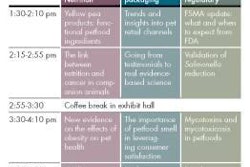January 4 -- a year after the Food Safety Modernization Act was signed into legislation -- was the date several of its key provisions were to take effect. According to FDAImports.com, the Food and Drug Administration has failed to finalize these provisions by the deadline.
This is not at all a surprise, for several reasons. On one hand, huge bureaucracies, especially ones that are part of a government, tend to move very slowly, and that is probably truer for FDA than most governmental agencies. Also, though US Congress might be increasing FDA's funding by 3% this year (including a significant chunk of cash for food safety), the agency has been chronically underfunded and understaffed. Given the long list of FSMA provisions that were supposed to be completed by now (in addition to other Congressional mandates), it was predictable that FDA wouldn't be able to meet the deadline with its current resources.
Also, as Benjamin England notes on his FDAImports.com blog: "In one sense, however, these are very complicated guidances and regulations FDA is expected to issue. It is better that it takes longer and perhaps get it right."
Yet another reason the agency may have missed the mark this time holds promise for the industries affected by FSMA (food, petfood and feed) and how they work with FDA, I believe. I have heard many accounts since FSMA was enacted that FDA, recognizing the act's many requirements along with its own limited resources, has actively reached out to the industries for input and/or welcomed entreaties from industry representatives for suggestions and ideas.
For example, FDA tapped the Institute of Food Technologists to lead two traceability pilot programs to test and study product tracking systems. And I know of members of the petfood industry who have met with various officials and departments within FDA to propose programs, industry collaboration and the like. (No official announcements have yet been made, so I have to be rather vague and mysterious, sorry.)
To me, these developments are positive for the human and animal food industries and for how FSMA provisions will continue to be developed and implemented. However, while FDA is seemingly willing to collaborate with industry to save time and maximize resources, it can still move only so fast when multiple entities are involved -- so that could be another factor delaying these overdue provisions.
Just think, the regulations and guidances would probably take even longer if FDA was trying to go it alone. At least with the industries' help, they also have a chance of being more effective at ensuring safe food for humans and animals while being less onerous.



















